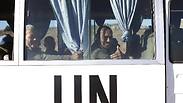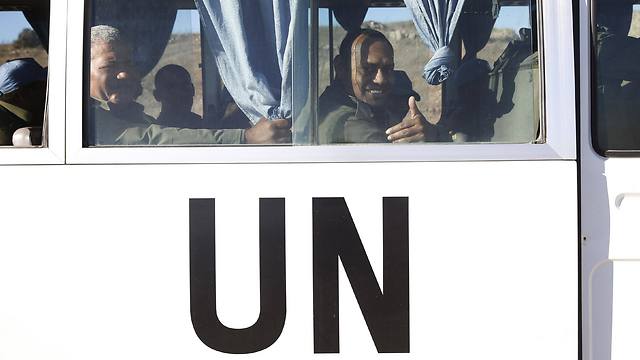
Fijian UN peacekeepers arrive in Israeli-held territory on the Golan Heights
Photo: Reuters
First came the emotional calls home and then the celebrations Friday as 45 Fijian peacekeepers held captive for two weeks by Syrian militants made it to safety.
Fiji's military chief described how his troops were released across the border at about midnight Fijian time, and were immediately given access to telephones to call their loved ones. By 2 am every affected family in Fiji knew the good news, Brig. Gen. Mosese Tikoitoga told reporters.

Fijian UN peacekeepers released by al-Qaeda-linked group gesture from inside a vehicle as they arrive in Golan Heights (Photo: Reuters)
Then, he said, came the grog ceremony. In Fiji, at least, that would mean drinking a potent local brew, kava, although the chief didn't say if that was the case.
"We could see the singing and drinking in the background, all the laughter, so they are all back to Fijian moods," said Tikoitoga, describing a video call he had with his troops. "And so I assume that all is well with them, at least emotionally."
The Fijians had been held captive by the al-Qaeda linked Nusra Front since Aug. 28. They were part of a 1,200-strong UN force that had been stationed in the Golan Heights, the disputed buffer zone between Syria and Israel.
Fiji's prime minister hailed the troops as "heroes."
"They kept their cool and showed restraint under the most extreme circumstances imaginable," Voreqe Bainimarama said. "Because of their discipline, not one militant was killed and none of our soldiers were harmed."
Still, the capture of the troops has raised questions both about the preparedness of the Fijian troops and of the future of the UN's four decade-long monitoring mission in the Golan Heights.
Tikoitoga said his troops had to make a decision to surrender Aug. 28, in consultation with UN commanders, based on their position and the firepower of the militants. He said they did so only after receiving reassurances from the Nusra Front that they would not be harmed.
He said his soldiers felt no hostility toward Filipino troops, who were also surrounded by the Nusra Front but who refused to surrender and later escaped.
"They made the choices they made in concurrence with their own government, and we respect that," Tikoitoga said. "For us, we've done what we needed to do for the safety of our people."
The chief said the released soldiers would go through medical and psychological testing before a decision was made about whether they would remain on duty in the region.
"The general feeling is that they want to stay," he said.















